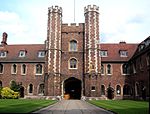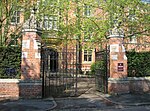Darwin College is a constituent college of the University of Cambridge. Founded on 28 July 1964, Darwin was Cambridge University's first graduate-only college, and also the first to admit both men and women. The college is named after one of the university's most famous families and alumni, that of Charles Darwin. The Darwin family previously owned some of the land, Newnham Grange, on which the college now stands.
The college has between 600 and 700 students, mostly studying for PhD or MPhil degrees with strengths in the sciences, humanities, and law. About half the students come from outside the United Kingdom, representing 80 nationalities as of 2016. Darwin is the largest graduate college of Cambridge. Darwin's sister college at Oxford University is Wolfson College.
Members of Darwin College are termed Darwinians. The college has several distinguished alumni including prominent heads of government and state, politicians, diplomats, and scientists from various countries such as British primatologist and anthropologist Jane Goodall, American conservationist Dian Fossey, Barbadian Governor-General Elliott Belgrave, Nobel Prize winner Elizabeth Blackburn, Nobel Prize winner Eric Maskin, Solicitor-General of the United States Paul Clement, Global Energy Prize winning scientist Thorsteinn I. Sigfusson, and Pulitzer Prize nominated neurosurgeon Paul Kalanithi.
Sir Ian Wilmut, the leader of the research group that in 1996 first cloned a mammal from an adult somatic cell (a Finnish Dorset lamb named Dolly), is also an alumnus of the college. Honorary fellows include Nobel laureate Amartya Sen, and the scientist Martin Rees. Notable students and fellows of Darwin College include British politician Oliver Letwin, Nobel Prize winner Richard Henderson and four Nobel Laureates. The college has 23 Fellows of the Royal Society among its current, emeritus, and honorary fellows including Dame Jane Francis.












